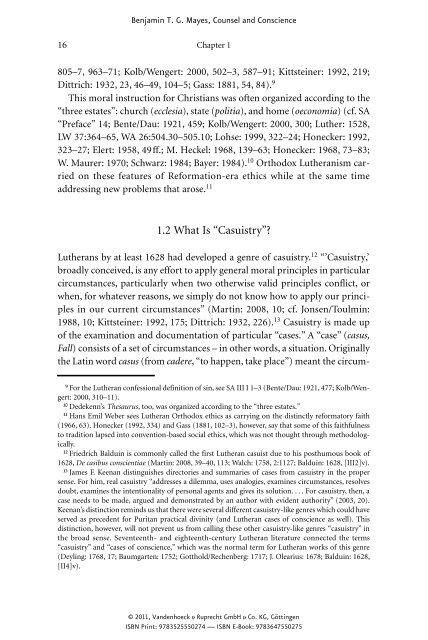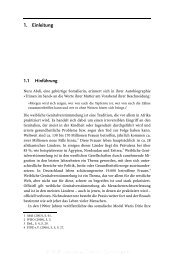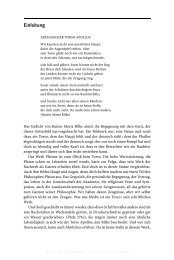Counsel and Conscience
Counsel and Conscience
Counsel and Conscience
Create successful ePaper yourself
Turn your PDF publications into a flip-book with our unique Google optimized e-Paper software.
Benjamin T. G. Mayes, <strong>Counsel</strong> <strong>and</strong> <strong>Conscience</strong><br />
16 Chapter 1<br />
805–7, 963–71; Kolb/Wengert: 2000, 502–3, 587–91; Kittsteiner: 1992, 219;<br />
Dittrich: 1932, 23, 46–49, 104–5; Gass: 1881, 54, 84). 9<br />
This moral instruction for Christians was often organized according to the<br />
“three estates”: church (ecclesia), state (politia), <strong>and</strong> home (oeconomia) (cf. SA<br />
“Preface” 14; Bente/Dau: 1921, 459; Kolb/Wengert: 2000, 300; Luther: 1528,<br />
LW 37:364–65, WA 26:504.30–505.10; Lohse: 1999, 322–24; Honecker: 1992,<br />
323–27; Elert: 1958, 49ff.; M. Heckel: 1968, 139–63; Honecker: 1968, 73–83;<br />
W. Maurer: 1970; Schwarz: 1984; Bayer: 1984). 10 Orthodox Lutheranism carried<br />
on these features of Reformation-era ethics while at the same time<br />
addressing new problems that arose. 11<br />
1.2 What Is “Casuistry”?<br />
Lutherans by at least 1628 had developed a genre of casuistry. 12 “’Casuistry,’<br />
broadly conceived, is any effort to apply general moral principles in particular<br />
circumstances, particularly when two otherwise valid principles conflict, or<br />
when, for whatever reasons, we simply do not know how to apply our principles<br />
in our current circumstances” (Martin: 2008, 10; cf. Jonsen/Toulmin:<br />
1988, 10; Kittsteiner: 1992, 175; Dittrich: 1932, 226). 13 Casuistry is made up<br />
of the examination <strong>and</strong> documentation of particular “cases.” A “case” (casus,<br />
Fall) consists of a set of circumstances – in other words, a situation. Originally<br />
the Latin word casus (from cadere, “to happen, take place”) meant the circum-<br />
� For the Lutheran confessional definition of sin, see SA III I 1–3 (Bente/Dau: 1921, 477; Kolb/Wengert:<br />
2000, 310–11).<br />
�� Dedekenn’s Thesaurus, too, was organized according to the “three estates.”<br />
�� Hans Emil Weber sees Lutheran Orthodox ethics as carrying on the distinctly reformatory faith<br />
(1966, 63). Honecker (1992, 334) <strong>and</strong> Gass (1881, 102–3), however, say that some of this faithfulness<br />
to tradition lapsed into convention-based social ethics, which was not thought through methodologically.<br />
�� Friedrich Balduin is commonly called the first Lutheran casuist due to his posthumous book of<br />
1628, De casibus conscientiae (Martin: 2008, 39–40, 113; Walch: 1758, 2:1127; Balduin: 1628, [III2]v).<br />
�� James F. Keenan distinguishes directories <strong>and</strong> summaries of cases from casuistry in the proper<br />
sense. For him, real casuistry “addresses a dilemma, uses analogies, examines circumstances, resolves<br />
doubt, examines the intentionality of personal agents <strong>and</strong> gives its solution. . . . For casuistry, then, a<br />
case needs to be made, argued <strong>and</strong> demonstrated by an author with evident authority” (2003, 20).<br />
Keenan’s distinction reminds us that there were several different casuistry-like genres which could have<br />
served as precedent for Puritan practical divinity (<strong>and</strong> Lutheran cases of conscience as well). This<br />
distinction, however, will not prevent us from calling these other casuistry-like genres “casuistry” in<br />
the broad sense. Seventeenth- <strong>and</strong> eighteenth-century Lutheran literature connected the terms<br />
“casuistry” <strong>and</strong> “cases of conscience,” which was the normal term for Lutheran works of this genre<br />
(Deyling: 1768, 17; Baumgarten: 1752; Gotthold/Rechenberg: 1717; J. Olearius: 1678; Balduin: 1628,<br />
[II4]v).<br />
© 2011, V<strong>and</strong>enhoeck & Ruprecht GmbH & Co. KG, Göttingen<br />
ISBN Print: 9783525550274 — ISBN E-Book: 9783647550275

















